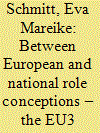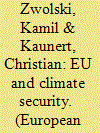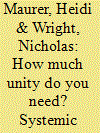|
|
|
Sort Order |
|
|
|
Items / Page
|
|
|
|
|
|
|
| Srl | Item |
| 1 |
ID:
153343


|
|
|
|
|
| Summary/Abstract |
This paper addresses whether Germany, France and the UK (the EU3) – with the EU in the background – can shape their own approach to a common Europeanised position or even a European role conception regarding the Iranian Nuclear Programme. As the EU3 initiative appears situated between Europeanisation and national role conceptions, it seems that the EU3 members – after a coherent start – were finally inclined to readapt themselves to certain of their national role conceptions, resulting in a “mix” of national and European role patterns in the process leading up to 2016. Currently, this mix hints at still-prevailing hindrances involved in genuine European conflict management, although this outcome holds the promise of greater European coherence in the future.
|
|
|
|
|
|
|
|
|
|
|
|
|
|
|
|
| 2 |
ID:
103195


|
|
|
|
|
| Publication |
2011.
|
| Summary/Abstract |
This article analyses the development of the European Union (EU) as a global actor in the area of climate security. Building on this, it explicitly draws on constructivist concepts such as norm entrepreneurship and epistemic communities. To this end, it adopts the framework of epistemic communities, as developed by Peter Haas, in order to suggest that there is a group of EU officials, EU member states and think-tank activists, who drive the climate security agenda of the EU. Thus, it examines the precise actors involved in this EU epistemic community for climate security. This group promotes a reason for action at the global level, resulting in the attempt to diffuse this norm: climate change has consequences for international security; thus, it requires the development of appropriate policies and capabilities within the EU and globally. This article suggests that the epistemic community on climate security has been effective at diffusing this norm at both levels, albeit with differences.
|
|
|
|
|
|
|
|
|
|
|
|
|
|
|
|
| 3 |
ID:
180560


|
|
|
|
|
| Summary/Abstract |
The Common Foreign & Security Policy (CFSP) is a transnational policy framework to deliver collective foreign policy and also to manage differences among member states. As such, it has always been dependent on their support. Since 2019, however, disagreement within this system is said to have reached a new level. Taking this political trend as our starting point, this article proposes a new, conceptual approach to understanding how contestation challenges the EU’s foreign policy cooperation system. While the majority of research focuses on disagreements in decision-making, we argue for a broader conceptualisation – systemic contestation. Drawing on norm contestation scholarship, we argue that systemic contestation manifests itself in two ways: as passive contestation, when member states disengage from and fail to take ownership of CFSP initiatives and their implementation; and as tacit contestation, when they fail to act when faced with the need to safeguard the system. This approach accounts for the transgovernmental character of the CFSP; and the central role of member states within it. Finally, we contend that our conceptualisation of systemic contestation offers promising new avenues for empirical research to understand the “black box” of EU foreign policy cooperation.
|
|
|
|
|
|
|
|
|
|
|
|
|
|
|
|
| 4 |
ID:
123264


|
|
|
|
|
| Publication |
2013.
|
| Summary/Abstract |
This article examines how cognitive and normative ideas influence the ability of the European Union (EU) to formulate common policies in response to international crises such as the 2002-2003 Iraq crisis and the Iranian nuclear crisis (since 2002). It argues that in crisis situations, i.e. in highly uncertain circumstances, ideas often become the principal guide for policy-makers. More specifically, ideas foster interpretations of a crisis along several core themes: above all, how the crisis issue is perceived, which means are deemed to be legitimate and/or effective and, depending on the particular crisis, how other relevant themes are seen, e.g. the appropriate relationship with the United States. Thus, the formulation of common EU crisis response depends on the convergence of these interpretations in Member States - as in the Iran crisis. On the contrary, if Member States' interpretations diverge beyond a common 'ideational space' - as in the case of Iraq - dissonance will be the probable outcome.
|
|
|
|
|
|
|
|
|
|
|
|
|
|
|
|
|
|
|
|
|